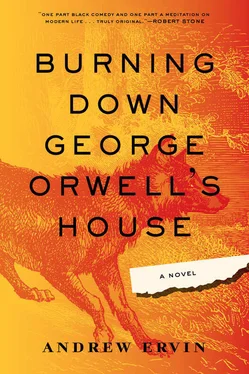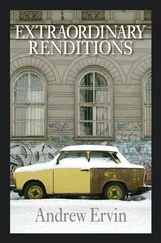An appointment ? He now needed a goddamn appointment to see his wife?
He texted Bud back:
SEE YOU THERE.
He opened the dishwasher, removed all the glassware that had sat in there so long that it had become dirty again, and then calculated the dishes’ best possible arrangement within the limited and awkwardly arranged rack space. Nothing seemed to fit right. Every angle was terrible. Next, he filled three garbage bags with pizza boxes and beer bottles and carried them down the hall to the chute like a derelict Santa Claus preparing to dump them in some bad girl’s chimney. They landed fifteen stories below with a crash of broken glass. He pulled the sheets off the bed and stuffed them in a mesh Kletzski’s Kleaners laundry sack and did the same with all the stray clothes.
While scanning the news, he spooned a bowl of cold cereal into his mouth. Every day another columnist or editorial writer made another superficial reference to George Orwell: Big Brother-this and thoughtcrime-that. Orwell hadn’t only predicted the current state of affairs, he had also provided innumerable journalists with a series of metaphors vague enough to pass as zodiac horoscopes.
CANCER (June 21–July 22) Constant surveillance by the state will undermine your autonomy as a free-thinking individual. Think for yourself and don’t be a copycat. Wear something red today.
Orwell was everywhere.
Ray pulled on a T-shirt and a pair of jeans, then tore a white Oxford out of the dry cleaner’s sterile plastic. He owned dozens of similar shirts, each with a different pattern of stains and amount of fraying at the collar. The oldest of them was little more than a rag tied to a wire hanger; it was his favorite shirt. Each Christmas, Easter, and birthday another identical one arrived in the mail courtesy of his mother. She had always been a creature of habit, but after the explosion had progressed toward the genuinely eccentric. Dementia had entered the picture. Exchanging three items every year was easier than attempting to explain to her yet again that he had put on a few pounds over the past fifteen years. It was nice that she still recognized his voice on the phone, but that was just a matter of time.
To get to the dry cleaner’s Ray had to face the weekend crowd of bad-art browsers and fake-fur-wearing nannies who zoomed their strollers down the sidewalk like they were racing chariots around ancient Sparta. Off-duty cubicle farmers jostled for sidewalk space with panhandlers and homeless war veterans and proud new parents bubbling over with moneyed angst. The gelato stand and microbrewery crowds spilled onto the sidewalks. Exclusive downtown galleries had opened local branches and brought with them chain coffee shops and national retailers of sweatshop-made clothing. It was all so depressing. He joined in the march-step choreography of the herd and carried his laundry through the crowds and to the mostly blind Polish lady down the street.
The ten-minute walk took him through an area that a decade earlier had tipped over to full-blown gentrification. During the last half century the neighborhood had mutated from a bohunk ghetto cut off from Chicago’s downtown by the river’s Main Branch into a post — GI Bill slum then into a Reagan Renaissance yuppie heaven of renovated row homes and chain boutiques selling mass-produced expressions of individuality. Considering that he had also contributed to the forced displacement and resettlement of the natives, Ray knew he was in no position to complain about the neighborhood colonialism. The local artistic scene had deteriorated after the painters and sculptors had been priced out of their studios by those, like himself, able and willing to pay exorbitant rent for the privilege of living among painters and sculptors.
A construction crew had razed an entire building since he had come home from work last night. A dirt field remained, now adorned with a billboard promising the imminent grand opening of another organic-foods franchise. He couldn’t recall what establishment had occupied the space just fourteen hours earlier. Life continued on. Someone had keyed the words “Oil Hogg” into the hood of an SUV parked in front of a sushi restaurant.
The dry cleaner’s door had a string of brass bells hanging from the inside handle. Mrs. Kletzski’s portable black-and-white TV was cranked up to its maximum, distorted volume.
“Raymond, where have you been hiding?”
“Hello, Mrs. Kletzski. How are you?”
“I’ve had some of your shirts ready for six weeks!”
“Right — I completely forgot about those.”
“I’m not responsible for garments left over six weeks!”
“How much do I owe you?”
“Do you have your ticket?”
“No, Mrs. Kletzski. I never have my ticket, remember?”
“You never have your ticket! Let me see if I can find your slip.”
He never saw other customers in the place, yet behind Mrs. Kletzski hung a serpentine of plastic-sheathed clothes. He wanted to go back there one day, maybe hide from the world for a few hours. There was definitely something wrong with him. He was thirty-three years old and wanted to do nothing more than play amid other people’s cleaned clothes.
“Welter! Eighteen dollars and twelve cents.”
Mrs. Kletzski’s pricing obeyed no specific logic. Identical loads could vary by as much as twenty dollars. He gave her a credit card. “I’m not going home right now. Can I leave these with you and get them later?”
“Sign here. This is your copy. I’m not responsible for garments left over six weeks!”
“I’ll get them later today, Mrs. Kletzski, I promise. Just the usual for these.” He lifted the laundry sacks onto the counter.
“What is it?”
“Sheets, towels. Clothes.”
“When do you need them?”
“No rush.”
“Monday?”
“Thank you, Mrs. Kletzski.”
The bells jingled when he left to battle the rollerbladers, meter maids, and surly pre-teens whose experiences of the physical world were limited to tiny display screens. The homeless people carried paper cups of gourmet coffee ringed with extra cardboard so they wouldn’t scald their fingers.
He was supposed to meet Bud at McCrotchety’s, the flagship of what would soon become a national chain of theme bars offering sanitized and smoke-free nostalgia. It was meant to resemble an old-fashioned Chicago day-load dive bar, but the traditional urine-and-burnt-peanut stink was missing, as were any real old-timer drunks, who were forced to huddle in the few real dives that remained. McCrotchety’s harkened back to an era brought to a close by bars like McCrotchety’s.
The bartendress opened a can of beer for Ray before he sat down.
“Thanks, Lily,” he said.
“So has Helen divorced your sorry ass yet?” Bud asked.
“We’re not getting divorced!”
“How long have you been separated?”
“Ten months.”
“When’s the last time you talked to her?”
“In fact, we spoke today. I have an appointment to see her on Wednesday.”
“An appointment ? That doesn’t seem strange to you?”
“We’re both very busy.”
“Busy hiring a lawyer to separate you from what’s left of your money.”
“You’re in rare form today. Who’re we playing?”
“Detroit.”
“I hate Detroit.”
“ ‘Hate’ is a very strong word.”
“I’m trying to get into the whole stupid spirit of male bonding and watching sports. Detroit sucks.”
“Like you mean it.”
“ Detroit sucks!”
“Almost.”
“Detroit sucks! ”
“Never fucking mind.”
“Detroit sucks!”
Lily came back over. “Hey, guys, I need you to watch the language. There are children at the bar.”
Читать дальше












